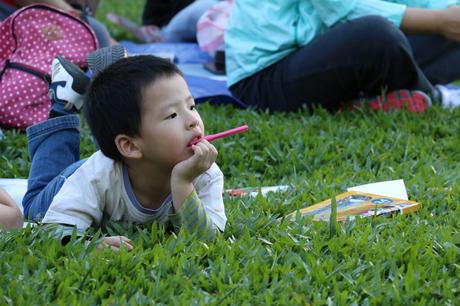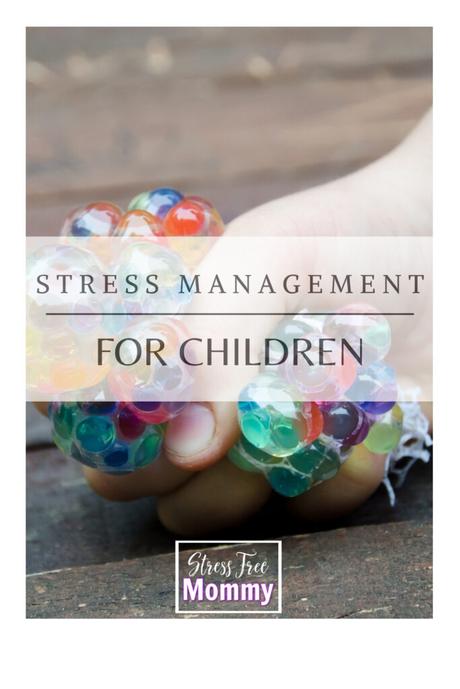Did you know that at some point in a child and adolescent’s life, 30% will experience some form of anxiety but 80% of them never get any help? Children, like many adults, encounter many different stresses in their childhood but parents can often be unaware of their child’s distress due to a misinterpretation of the child’s emotional cues. Therefore, an effective means of stress management for children can be achieved through first teaching them how to express themselves.
In this post, we will talk a look at some of the common causes, signs, and tips to help you learn how to reduce stress in children.
Stress in Children
Stress from what we understand, is simply how we react to a situation or the factor that affects an individual’s physical presence. In small quantities, stress can be good for us because it is often a motivating force and it can help make us more productive.
Nevertheless, too much stress (chronic stress) can be detrimental to any individual and children are not immune to its effects.
Many people assume children are not affected by stress because, “they do not have any responsibilities”, however, statistics show that 72 percent of children have negative behaviors linked to stress. Plus, more than 50 percent of children have had physical symptoms related to stress, such as tummy aches and headaches.
According to the American Psychological Association, about 20 percent of children have reported worrying a great deal and unfortunately, parents can often underestimate their child’s emotions.
Common Causes of Stress in Kids
Children may experience different kinds of stress from their parents but how they react emotionally may still be the same. Kids can experience stress from external factors such as problems in school, their relationships with their peers, or their family’s financial situations.
However, sometimes a child’s stress can arise from the anxiety caused by internal factors such as wanting to fit in with others in school or worrying about grades. Some common causes of stress in kids include;
Financial Instability
Although our children are not responsible for things in the home like money, job concerns, family turmoil, and relationships, these things can still cause a sense of powerlessness and anxiety for our children.
They will compare themselves to children with families in better financial situations which will add to their anxiety. They may also feel helpless but still feel the need to want to help.
Overly-Packed Schedules
A busy schedule can cause stress on anyone. When children have to continuously run to and from one activity to another, this can cause a lot of stress on them.
So just like us parents, children need some time to wind down every now and then.
If your children have a busy schedule you may want to ask them how they feel about it. If it is too much on them, think about readjusting their schedules.
Academic Pressure
Believe it or not, a lot of children feel anxious about doing well in school. Children can express anxiety about their grades and not because of the pressure parents have put on them.
My daughter was actually afraid of making mistakes on her work and disappointing her teachers and my sons have shown stress about not doing well in their performances, imagine the anxiety this has to bring upon them.
We as parents often feel pressure and anxiety when we have to meet deadlines. Academic pressure is very common in children and something we as parents must be able to help our children through.
Popularity
Schools have a lot of different social groups and cliques and the need to fit into one of these groups can be very stressful for children. I remember the agony of being excluded or left out and this can be an issue, especially for younger children.
Encourage your child to feel good about themselves and celebrate their achievements. It is said that children who feel good about themselves are less likely to stress about peer pressures.
Bullying
Bullying is a very serious problem for many children. Statistics show that 17 percent of children and teens are bullied every day.
Whether it is in school, online, or even in their homes, bullying has become a serious issue and is one that parents are often unaware of. Children may be too embarrassed or frightened to tell their parents or teachers and may not want to draw attention to themselves.
So it is important for parents to look for some of the signs of bullying to better help their children.
Signs of bullying may include:
- Fear of going to school, walking to the bus, or loss of interest in schoolwork
- Unexplained injuries
- Torn, damaged, missing, clothes, or books
- Emotional changes, physical symptoms such as tummy aches, poor appetite, headaches
When my daughter was being bullied in school, the first thing I noticed was the change in her mood. She no longer became interested in going to school.
Bullying can destroy your child’s self-esteem and is something to take very seriously.
Abuse
Children living in violent surroundings, both mentally and physically, experience stress. Parents who continuously beat their kids are also causes of this stress.
The fear that is manifested in kids may disorient them. They will not be able to talk about how they feel to anyone and will instead keep these feelings bottled up inside.
What are the signs of stress?
Children of all ages but especially smaller children may find it harder to express or recognize when they are stressed because of their maturity level. Their stress can express itself through changes in behavior.
Common changes may include:
- mood swings
- irritability
- decreased interest in activities that gave them pleasure
- complaining about school
- crying
- surprising fearful reactions
- sleeping too much or too little
- overeating
- eating too little
Teens will express signs of stress through things like abandoning long-time friendships for new friends, avoiding their parents, or becoming more hostile toward family members.
Although we may understand that stress itself is not negative, how we react to stress can have a negative impact on our systems and too much stress can affect your child’s nervous and immune system.
This will make your children more susceptible to diseases and infections. Other issues have been linked to childhood stress such as depression, alcoholism, eating disorders, and chronic diseases.
Preschool and toddlersElementary-age childrenPreteens and teenagers
Anger
Anxiety
Eating and sleeping problems, including nightmares
Fear of being alone
Irritability
Regressing to infant behaviors
Trembling with fright
Uncontrollable crying
Withdrawal
Being distrustful
Complaining of headaches or stomach aches
Feeling unloved
Having no appetite
Having trouble sleeping
Needing to urinate frequently
Bed-wetting
Not caring about school or friendship
Acting withdrawn
Worrying about the future
Anger
Disillusionment
Distrust of the world
Low self-esteem
Stomach aches and headaches
Panic attacks
Rebellion
Continuous stress in a child can not only cause physical symptoms but it is also bad for growth, health, and their activities. There are a variety of causes for stress in children and just like with adults stress can be caused by both negative and positive situations.
Stress Management for Children

There are many different ways to help reduce stress in children. Many of the ways to get stress relief are similar to coping methods used by adults. We will talk about some ways that have been effective for me and most parents.
Model healthy coping methods
Since your children’s negative and positive behaviors are mainly taught by you, their first teacher, it is important for you to set a good example of healthy coping methods.
When you are stressed, your child watches and learns how you react to stress, therefore, take the time to first learn how to properly learn how to deal with stress. Then you will be able to help your child better deal with their own stress more effectively.
Provide a good example by showing your children you can keep calm under stressful situations and express your anger appropriately.
Encourage good sleep habits
A good night’s sleep is more important to your ability to deal with stress than most of us are aware and children need their sleep. When adults are tired, we can be more agitated, less patient, and have less strength to tackle our tasks.
Being tired can make it harder to function which in turn makes you more stressed and this is no different for our children.
Therefore, it is important to make sure your children get enough sleep at night as well as stick to a daily sleep schedule.
Schedule stress-relieving activities
Since in theory, when your body feels good so does your mind, it is important to allow your children to spend time participating in stress-relieving activities.
Any physical activity such as exercise or any activity that is fun and stimulates creativity would be a great way for your child to get their mind off of what may be stressing them. Here are a few of my favorite:
- Painting
- Singing
- Jump rope
- Blowing bubbles
- Flying a kite
- Walking
- Hula hooping
Find a few different activities that your child enjoys and then encourage them to regularly participate.
Teach mindfulness
Mindfulness is a great way to help kids of any age relieve stress by incorporating meditation, breathing exercises, and more to promote happiness.
There are many benefits to teaching your child mindfulness from improved focus to improved academic performance. So not only will you be helping your child improve their stress but you will be giving them useful skills to use in life.
Don’t over-schedule
Overbusy schedules can be a cause for many problems including stress. However, did you know that your busy schedule can also lead to health problems?
Overbusy schedules can prevent you from getting the necessary amount of sleep needed which will add to the stress. Constant exposure to stress means the consistent rise in the stress hormones – cortisol and adrenaline.
High amounts of these hormones are said to age your body, shrink your brain, and compromise your immune system.
So it is important to choose your children’s schedules wisely to lessen their stress, the chances of them getting bored with the same activities, and to prevent them from suffering from stress-related health issues.
Talk it out
Children have a harder time expressing their stress to their parents. This is due to the fact that emotions like “happy”, “worried”, “sad”, or “scared”, we teach to our children but we often don’t teach them what it means to be stressed.
My daughter, for instance, explained to me that, “stress is when you feel frustrated”. She was able to explain that a person may be stressed about money but she couldn’t find the right words to express her own stress.
It made me realize that it was my responsibility as a parent to not only make sure my daughter understood what stress meant but I also am responsible for talking to my children to make sure I know when she is stressed.
Talk with your children, teach them what it means to be “stressed out” so they can properly express this to you and you can take the steps to help them manage it.
Help your child with expressing themselves by acknowledging their feelings. Then reassure them and let them know you understand why they feel the way they do.
Since some children’s stress comes from the fear of messing up or making mistakes, it is important to teach your children that mistakes can be used as a learning experience.
Show them how much you care for them with a hug and do this often. Hugs are a great stress-reliever.
Encourage healthy eating habits
It is said that eating healthy can reduce the negative effects of stress on your body. Find creative ways to encourage your children to eat their fruits and veggies.
You and your children can better handle stress when your body is healthy.

Last Things to Know About Stress Management for Children
Children face stress more often then some of us realize. That is due to our children’s inability to properly express their stress.
So as parents and our children’s teachers, it is very important to set an example of how to not only express stress but to properly cope with it.
That way our children can get the help they so importantly deserve.
But, how can we teach our children to deal with stress if we ourselves can’t handle it properly?
So be sure you are taking the steps to properly manage your own stress and set an example of positive coping methods for your children.
Once you have given your child the tools to communicate their stress and you’ve laid down the foundation to help them manage stress you can help them pick a healthy schedule full of fun activities and help them enjoy a diet full of nutritious foods and a stress-free childhood.
What tools do you use to help your children with stress management? Why do you think we forget to teach our children how to properly express “stress”?

